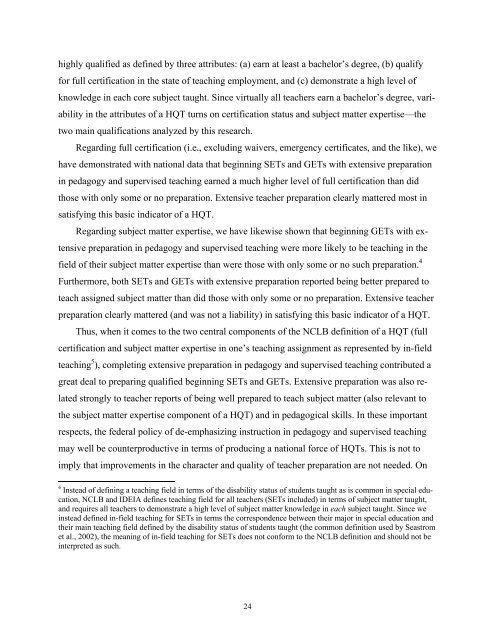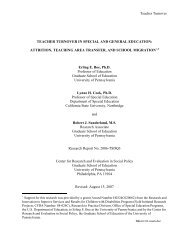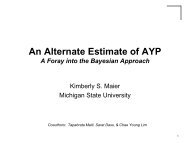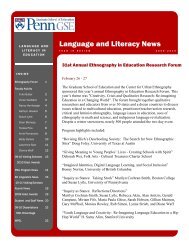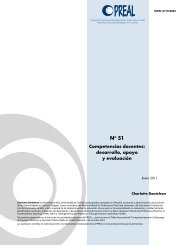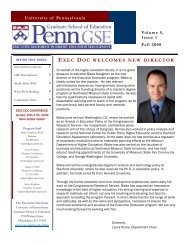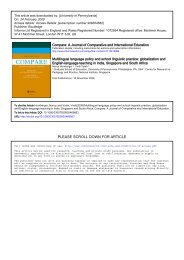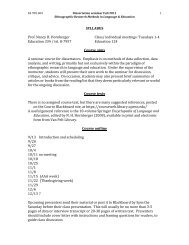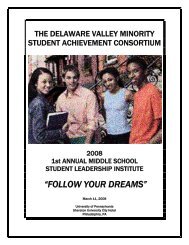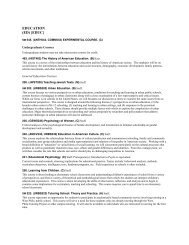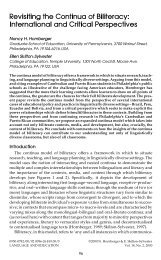does teacher preparation matter for beginning teachers in
does teacher preparation matter for beginning teachers in
does teacher preparation matter for beginning teachers in
You also want an ePaper? Increase the reach of your titles
YUMPU automatically turns print PDFs into web optimized ePapers that Google loves.
highly qualified as def<strong>in</strong>ed by three attributes: (a) earn at least a bachelor’s degree, (b) qualify<br />
<strong>for</strong> full certification <strong>in</strong> the state of teach<strong>in</strong>g employment, and (c) demonstrate a high level of<br />
knowledge <strong>in</strong> each core subject taught. S<strong>in</strong>ce virtually all <strong>teacher</strong>s earn a bachelor’s degree, variability<br />
<strong>in</strong> the attributes of a HQT turns on certification status and subject <strong>matter</strong> expertise—the<br />
two ma<strong>in</strong> qualifications analyzed by this research.<br />
Regard<strong>in</strong>g full certification (i.e., exclud<strong>in</strong>g waivers, emergency certificates, and the like), we<br />
have demonstrated with national data that <strong>beg<strong>in</strong>n<strong>in</strong>g</strong> SETs and GETs with extensive <strong>preparation</strong><br />
<strong>in</strong> pedagogy and supervised teach<strong>in</strong>g earned a much higher level of full certification than did<br />
those with only some or no <strong>preparation</strong>. Extensive <strong>teacher</strong> <strong>preparation</strong> clearly <strong>matter</strong>ed most <strong>in</strong><br />
satisfy<strong>in</strong>g this basic <strong>in</strong>dicator of a HQT.<br />
Regard<strong>in</strong>g subject <strong>matter</strong> expertise, we have likewise shown that <strong>beg<strong>in</strong>n<strong>in</strong>g</strong> GETs with extensive<br />
<strong>preparation</strong> <strong>in</strong> pedagogy and supervised teach<strong>in</strong>g were more likely to be teach<strong>in</strong>g <strong>in</strong> the<br />
field of their subject <strong>matter</strong> expertise than were those with only some or no such <strong>preparation</strong>. 4<br />
Furthermore, both SETs and GETs with extensive <strong>preparation</strong> reported be<strong>in</strong>g better prepared to<br />
teach assigned subject <strong>matter</strong> than did those with only some or no <strong>preparation</strong>. Extensive <strong>teacher</strong><br />
<strong>preparation</strong> clearly <strong>matter</strong>ed (and was not a liability) <strong>in</strong> satisfy<strong>in</strong>g this basic <strong>in</strong>dicator of a HQT.<br />
Thus, when it comes to the two central components of the NCLB def<strong>in</strong>ition of a HQT (full<br />
certification and subject <strong>matter</strong> expertise <strong>in</strong> one’s teach<strong>in</strong>g assignment as represented by <strong>in</strong>-field<br />
teach<strong>in</strong>g 5 ), complet<strong>in</strong>g extensive <strong>preparation</strong> <strong>in</strong> pedagogy and supervised teach<strong>in</strong>g contributed a<br />
great deal to prepar<strong>in</strong>g qualified <strong>beg<strong>in</strong>n<strong>in</strong>g</strong> SETs and GETs. Extensive <strong>preparation</strong> was also related<br />
strongly to <strong>teacher</strong> reports of be<strong>in</strong>g well prepared to teach subject <strong>matter</strong> (also relevant to<br />
the subject <strong>matter</strong> expertise component of a HQT) and <strong>in</strong> pedagogical skills. In these important<br />
respects, the federal policy of de-emphasiz<strong>in</strong>g <strong>in</strong>struction <strong>in</strong> pedagogy and supervised teach<strong>in</strong>g<br />
may well be counterproductive <strong>in</strong> terms of produc<strong>in</strong>g a national <strong>for</strong>ce of HQTs. This is not to<br />
imply that improvements <strong>in</strong> the character and quality of <strong>teacher</strong> <strong>preparation</strong> are not needed. On<br />
4 Instead of def<strong>in</strong><strong>in</strong>g a teach<strong>in</strong>g field <strong>in</strong> terms of the disability status of students taught as is common <strong>in</strong> special education,<br />
NCLB and IDEIA def<strong>in</strong>es teach<strong>in</strong>g field <strong>for</strong> all <strong>teacher</strong>s (SETs <strong>in</strong>cluded) <strong>in</strong> terms of subject <strong>matter</strong> taught,<br />
and requires all <strong>teacher</strong>s to demonstrate a high level of subject <strong>matter</strong> knowledge <strong>in</strong> each subject taught. S<strong>in</strong>ce we<br />
<strong>in</strong>stead def<strong>in</strong>ed <strong>in</strong>-field teach<strong>in</strong>g <strong>for</strong> SETs <strong>in</strong> terms the correspondence between their major <strong>in</strong> special education and<br />
their ma<strong>in</strong> teach<strong>in</strong>g field def<strong>in</strong>ed by the disability status of students taught (the common def<strong>in</strong>ition used by Seastrom<br />
et al., 2002), the mean<strong>in</strong>g of <strong>in</strong>-field teach<strong>in</strong>g <strong>for</strong> SETs <strong>does</strong> not con<strong>for</strong>m to the NCLB def<strong>in</strong>ition and should not be<br />
<strong>in</strong>terpreted as such.<br />
24


